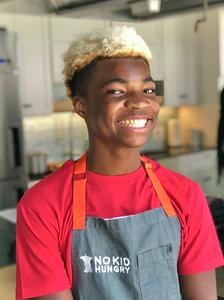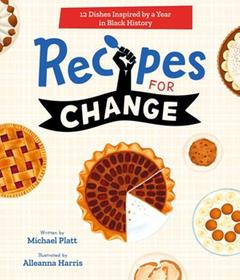
|
|
| (photo: Danita Platt) | |
Cooking has given Kids Baking Championship alum Michael Platt a large platform to advocate for issues he's passionate about, such as racial justice and food security. He featured these themes in his first cookbook, Michael's Desserts: Sweets for a Cause, and revisits them in his second cookbook, Recipes for Change (Abrams, $18.99), which includes 12 recipes inspired by moments in Black history. He revamps traditional cuisine to create an interactive narrative that reflects the harm--and the hope--of Black people living in the United States. Platt spoke with Shelf Awareness about food as family, food as history, and food as justice.
Each dish included in Recipes for Change is served up with a slice of history. What are your earliest memories related to food or eating with loved ones?
I've always been in the kitchen with my family. When I was three or four years old, my mom taught me and my older brother table etiquette. Being a home economics teacher, she wanted us to learn basic skills early, like how to correctly eat green beans versus, say, asparagus. How to pour milk for our cereal. How to properly cut certain foods. I do remember feeling curious at that point. I also found not being able to eat green beans (especially long ones) with my hands annoying.
But it wasn't until I was nine or 10 that I really got interested in what was happening in the kitchen. My maternal grandmother was the first person I baked with--I got to take the lead on making a cake for a family dinner. It was a two-layer chocolate cake with chocolate icing. From there, I started making random stuff I saw on YouTube and watching other cooking videos.
What role do you think food plays in the lives and storytelling of Black communities?
Food plays a really important part in everyone's life. We all learn how to cook from someone. In my family, it's been a parent. I can track food I eat now to similar dishes that my grandmother and great-grandparents ate. So, it's a vital part of being able to connect with your personal history. My family's sweet potato pie recipe, in particular, is one we can trace back generations. We all know it so well that no one has written down the recipe.
 How does food justice connect to Recipes for Change?
How does food justice connect to Recipes for Change?
I regularly collaborate with organizations like PLATTE and No Kid Hungry that are working to address food insecurity, so I remain hyper-aware of how food has supported certain communities throughout history. For example, "The Montgomery Bus Boycott's Pound Cake" recipe in the book is based on a woman named Georgia Gilmore who sold pound cakes to raise money during the bus boycotts. This ultimately helped to supplement protestors' and organizers' incomes, as folks chose not to work to demand more civil liberties or couldn't get to work because of the boycott. This book illustrates how food helped to feed and fuel notable moments, movements, and individuals in Black history.
Which of these had the most influence on the recipes you decided to include in the book: people, places, events, or ingredients?
They all did! But the people were shaped by the times they were living in. So, if you remove any person, all these stories would likely be really different in terms of ending and impact. In fact, I hadn't even heard of Georgia Gilmore until I started researching the book.
And I very much enjoyed figuring out how to incorporate parts of the "I Have a Dream" speech into my "Martin Luther King's Favorite Pecan Pie" recipe. My whole life, I have been hearing and seeing images from that moment, starting with a photo hanging on the wall in my grandmother's bathroom.
Was there a recipe you still wish had made the "final cut"?
I wish my recipe for Johnny Cakes could have been included in this book. I love them and their history--and they're delicious! Fun fact: they were also originally known as "journey cakes" because they were a food that the enslaved and Indigenous peoples of North America carried with them. Later, they were a staple for folks involved with the Selma to Montgomery March.
What content in your cookbook might be particularly interesting for other young chefs?
I think all the recipes give young chefs information and skills they can use in other dishes. For instance, "The Montgomery Bus Boycott's Pound Cake" recipe involves creaming butter and sugar until it's light and fluffy. This is a kind of emulsion, and emulsions are used all the time to make sauces and salad dressings, as well as to stabilize baked goods. I also think the "Juneteenth's Red Ice Pops" are really customizable for young chefs--and are a great way for them to experiment with different flavors.
How has your cooking style evolved over the years?
I've stopped using certain techniques that other chefs swear by. Like, I no longer use fondant or buttercream on baked goods because I think other icing tastes better. Also, I continue to learn more about Black history and African American foodways. One aspect in particular I am fascinated by is the large role pork fat (lard) has played in African American food culture. A lot of our foods have a stigma that they are unhealthy (due to being potentially high in cholesterol and sodium). But Black people in this country are very resourceful. We can use every single part of pig when cooking: the feet, ears, intestines. We also needed to cure meat products like bacon and ham to prevent spoilage. And what didn't have enough taste to be edible was repurposed into soap or added in while mixing the batter to keep bread and cakes moist. We have always represented a "zero waste" perspective. And the same can be said of our use of vegetables. We use a large variety of field greens--collard, mustard, and kale--and will drink the broth too!
What are you working on now? Willing to share any teasers about your next professional endeavor?
I'm working on a new cookbook: currently planning the theme, recipes, and stories that will be included. The next step after that will be testing the recipes to put it all together. It's a combo of recipes I know very well that are straightforward, so I hope they will all be easy to incorporate. But sometimes there ends up being one that I need to make and tweak multiple times before it's ready, like the cinnamon rolls recipe that was in my first book. I am also working on a food documentary with my brother, who is a filmmaker. It's about the history and importance of lard.
Have you purchased a cookbook recently?
Yes! Black Power Kitchen by Ghetto Gastro founders Jon Gray, Lester Walker, and Pierre Serrao and Osayi Endolyn. I like this cookbook for the overall design. There are interviews, artwork, poems, stories, great photography, and (of course) recipes. --Rachel Werner, author and teaching artist at Hugo House, Lighthouse Writers Workshop, and The Loft Literary Center

